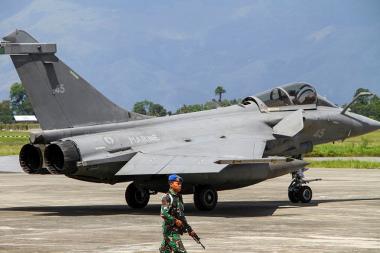India-Pakistan Dynamics After Balakot: A Different Deterrence Equation?

Even before coming to office in 2014, Prime Minister Narendra Modi had implied that his government would address Pakistan-sponsored terrorism differently
by
Rajeswari Pillai Rajagopalan
India has been battling cross border terrorism with no clear success for more than three decades. Fear of possible nuclear escalation by Pakistan has traditionally restricted successive Indian governments in responding to such attacks, a fear which became particularly acute after India and Pakistan went openly nuclear in 1998. However, the Indian airstrike on a terrorist camp in Balakot within Pakistan in February 2019, in response to a terrorist attack by Pakistan-based terror group Jaish-e-Muhammad that killed nearly 40 Indian troops, is indicative of a possible change in Indian thinking. It remains unclear if this was a one-off response driven by domestic audience pressures or a broader shift in strategy. But if it is a change in strategy, New Delhi needs to be better prepared for escalation in the future than it as yet appears to be.
Even before coming to office in 2014, Prime Minister Narendra Modi had implied that his government would address Pakistan-sponsored terrorism differently. The first instance of this difference as reflected in action was in 2016 when the Indian government carried out retaliatory strikes across the Line of Control (LoC) in response to a terrorist attack on an Indian Army camp at Uri in Indian-administered Kashmir that killed 19 Indian soldiers. While reports suggest that such retaliatory strikes took place in the past as well, this was different. This time around, the Indian government chose to publicise these strikes, calling them “surgical strikes.” In the past, even when limited strikes were undertaken across the LoC, it was not advertised for fear that there could be tit-for-tat retaliation that could spiral into a full-fledged conflict, possibly escalating to a nuclear exchange between the two countries. This fear of escalation has for long had a significant influence on Indian decisionmakers. India likely did not respond to major terrorist attacks, be it the terrorist attack on the Indian Parliament in 2001 or the Mumbai terrorist attack in 2008, because of this fear. Therefore, the decision to take credit for the 2016 surgical strikes possibly indicated new Indian thinking on escalation and deterrence in the India-Pakistan context.
The fear of escalation has for long had a significant influence on Indian decisionmakers.
The Modi government’s new approach was not only different from that of the previous government but seemed to hark back to earlier thinking articulated by both then-Indian Army Chief General V.P. Malik and then-Indian Defence Minister George Fernandes in the aftermath of the Kargil war. Both had argued, presumably based on the intense, weeks-long war that India successfully prosecuted, that there was sufficient space for a conventional war under the nuclear umbrella and that India need not worry about nuclear escalation.
This strategy of limited airstrikes appeared to have worked in Balakot as well. Likely bolstered by the limited reaction from Pakistan to the surgical strike in 2016, the Modi government decided to escalate in 2019 by striking a terrorist camp inside Pakistan in response to the Pulwama attack. Despite repeated previous statements threatening nuclear escalation, Pakistan’s response stayed at the conventional level. Even at the conventional level, Pakistan’s response was arguably neither escalatory nor proportionate because no Indian facility was hit. Moreover, the Indian pilot whose plane was shot down by Pakistan in an aerial dogfight was returned without any concessions even being demanded from New Delhi.
Pakistan’s limited, conventional response suggests a few conclusions about the current state of deterrence between India and Pakistan. One, Pakistan’s strategy of using the fear of escalation, including the threat of use of nuclear weapons, has lost its value. India has disproven Pakistan’s claims and called the nuclear bluff twice now. Second, there are clear implications in terms of international involvement. Pakistan’s “catalytic” strategy, as Vipin Narang calls it, to get foreign powers involved in an India-Pakistan conflict may have run its course.
Throughout the 2000s, Pakistan’s dubious role in the global war on terror and in Afghanistan was a cause for concern to the United States and others, which led to Pakistan losing the sympathy it may have previously enjoyed.
In fact, Pakistan’s catalytic strategy has boomeranged on it a couple of different times. During the Kargil War in 1999, Pakistan invited foreign involvement, assuming it would be in its favour. But even though the United States got involved, it was in support of India. Pakistan had not understood that international circumstances had changed — Cold War politics in South Asia and the Afghan conflict in the 1980s may have previously factored into US support for Pakistan, but that was no longer true. Moreover, Pakistan’s role in the Kargil conflict was also very blatant — it was clear to the United States and the global community that it was a Pakistan Army operation. The Pakistani intelligence’s role in the 2008 Mumbai terror attacks was also evident. In fact, throughout the 2000s, Pakistan’s dubious role in the global war on terror and in Afghanistan was a cause for concern to the United States and others, which led to Pakistan losing the sympathy it may have previously enjoyed. Pakistan’s own overreach in supporting cross border terrorism has eroded consideration for its point of view on Kashmir.
Meanwhile, the changing balance of power in the Indo-Pacific has benefited New Delhi. India has become more important for the United States and other Indo-Pacific powers, and it has developed closer strategic partnerships with them in the context of China’ rise and growing aggressiveness in the region. India’s role as a balancer and Pakistan’s close alignment with China are among the reasons why many countries in the region are unlikely to side with Pakistan in an India-Pakistan conflict.
India has also become important because of its growing economic clout. The size of the Indian economy is almost USD 3 trillion, and it is one of the largest economies globally (especially in purchasing power parity terms). On the other hand, Pakistan’s economy at slightly over USD 300 billion is only about a tenth of India’s, with the gap between the two seemingly widening every year. Thus, comparing the two economically is a meaningless exercise. And though India’s growth rate has slowed down a bit recently, it is still estimated to be one of the growth engines in the Indo-Pacific in the future.
India’s current domestic troubles could make it a less attractive strategic partner for many countries. The changes that India is making to its citizenship laws under the Citizenship Amendment Act and the proposed National Register of Citizens have been interpreted both inside and outside the country as targeting Indian minorities, deeply damaging India’s reputation as a liberal, secular democracy.
However, India’s current domestic troubles could make it a less attractive strategic partner for many countries. The changes that India is making to its citizenship laws under the Citizenship Amendment Act and the proposed National Register of Citizens have been interpreted both inside and outside the country as targeting Indian minorities, deeply damaging India’s reputation as a liberal, secular democracy. Though nominally a separate issue, this may weaken India’s position on Kashmir because external actors could become less sympathetic to New Delhi if it is seen as persecuting minorities at home.
On the deterrence front too, India has work to do. While it is true that India has re-established a certain amount of deterrence in the India-Pakistan context, its declining defence budget and the resultant capacity deficit could produce outcomes that are unfavourable, at least in the initial stages of any escalation. In fact, if the Balakot strikes had led to escalation beyond Pakistan’s limited response, India’s costs could have gone up considerably and unnecessarily. This could mean that India would bear greater costs the next time around unless its military preparations improve and domestic troubles are dealt with.



